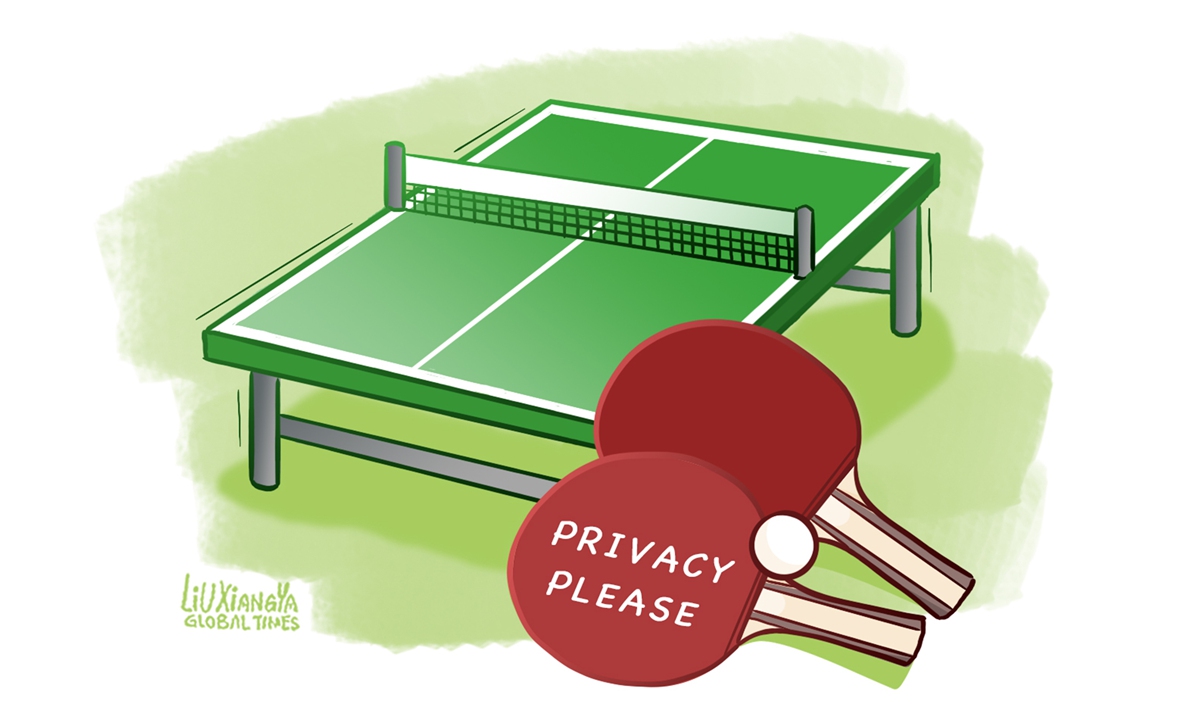
Illustration: Liu Xiangya/GT
In the early hours of Sunday,
mk China's table tennis Olympic champion Fan Zhendong posted a video on his personal Sina Weibo account along with a heartfelt message: "Thank you all for your support, but there are better ways and occasions to show it. Stay true to your path and respect others' boundaries. I earnestly ask for fans' understanding and respect." The video shows throngs of fans, holding their phones, crowding and waiting outside an elevator to take photos and videos of Fan. The post soon sparked discussions online about the reasonable boundaries between celebrities and fans.
Fan's appeal sounds a renewed call to reduce irrational fan culture's negative impact on athletes and the sports industry, while pushing people to find solutions to improper behaviors that undermine athletes' well-being and the sports industry in general.
The sports arena is a sacred ground for hard work and determination, not a stage for irrational fan culture and glaring invasions of athletes' privacy. Allowing athletes to focus on their sports and careers is the expectation of all fans and the foundation for the sustainable and healthy development of Chinese sports.
Many rational fans voiced their support for Fan, replying to his message that "Meeting on the court is the right way and the best support. Please give athletes the respect they deserve." "We hope everyone can be rational when attending matches, maintain normal social distance, and avoid excessively disturbing athletes," said another Sina Weibo user.
On Saturday evening, during a 2024 China Table Tennis Super League group stage match, the 27-year-old Fan had come from behind to overpower Lin Shidong 3-1 in a thrilling face-off in Central China's Hunan Province.
After the match, however, Fan was surrounded and pursued by fans at the hotel elevator, making it difficult for him to leave. Later, he took to social media at night to appeal to fans for understanding and respect. In the following match on Sunday morning, Fan lost to Xu Yingbin 0-3.
Fan's message is not merely a personal plea but a broader reminder to reflect on fan culture. A rational and inclusive atmosphere for spectatorship is encouraged, one that returns sports to its core values of sportsmanship, perseverance and unity.
This is not the first time that Fan took to social media to appeal for fans to be respectful.
In March, Fan posted a statement via Sina Weibo, urging fans not to violate his privacy after someone allegedly disseminated his personal ID number on the internet, seriously violating his rights to privacy.
Fan said in an interview with China Central Television after the Paris Olympic Games that he had been troubled by "fan culture." "Too much attention is placed on off-court matters, which creates a lot of pressure. Sometimes it feels like losing a game isn't acceptable, but even winning doesn't seem to be enough. This brings no benefits to me, the team, table tennis, or unity among everyone - it's entirely harmful," he said.
Originated from the entertainment industry, distorted fan culture involves irrational and obsessive behaviors by fans toward their idols. This includes indiscriminate invasions of the idol's privacy, imposing personal expectations on them, and engaging in improper actions against fans of other celebrities. Such behavior not only harms the athletes' public image but also misuses public resources.
China's national terams in table tennis, swimming, speed skating and more are some of the celebrity groups often plagued by the consumption of fanatical fans as athletes have to deal with paparazzi-like scrutiny and criticism from fans, which can erode their concentration on their performance and improvement.
This pressing issue lays bare regulatory gaps and lack of healthy fan engagement. Tackling the issue requires collaboration among fans, athletes, organizations, and media to foster a healthier and more respectful sports culture.
As the commercialization of sports grows, there is increasing pressure on athletes to cater to their fanbases and public images, leading to a more performance-driven, sensationalized culture. Marketing strategies often focus on the personalities of athletes instead of their athletic skills, which can blur the line between sports and entertainment.
Creating diverse avenues for fan engagement that focus on different aspects of sports, such as team dynamics, tactical analyses, and historical achievements, can help balance fan interests. This will help dilute the focus on individual athletes and foster a more well-rounded appreciation of the sport.
Social media platforms and fan communities should be better regulated to prevent cyberbullying, extreme behavior, and the spread of misinformation. Establishing clear codes of conduct for fans and holding online platforms accountable for allowing irrational behaviors can reduce distorted fan culture.
Besides, the media should take steps to reduce their celebrity-driven focus of coverage. By promoting the athleticism, skill and hard work of players, rather than creating a spectacle around their personal lives, the narrative can be reoriented to one of professional respect.
The author is a reporter with the Global Times. life@globaltimes.com.cn

